
'Folklore is the informal expression and practice of social groups, large and small. These groups.. may be as small as a family or as large as a nation. Folklore .. consists of the shared expressions and practices of folk groups, including: verbal forms such as song, verse, story, jokes; behavioural forms such as customs and beliefs, dance and drama; material forms such as art, craft, architecture, food, medicine, costume and a variety of other forms, such as photocopy and electronic folklore, gestures and music.' (Seal, 2001, p. 3).
The WA Folk Archive records, preserves and gives the public access to the rich folk traditions, past and present, of Western Australians. It is the only state folklore archive in Australia and provides a unique and valuable resource for research, education and tourism.
The Archive was established in 1985 by Professor Graham Seal as a repository for the fieldwork projects of WA Institute of Technology (later Curtin University of Technology) students enrolled in a Folklore unit as part of the Bachelor of Arts in Australian Studies course.
The Archive expanded over time to include other material including projects undertaken by students in the Research Institute for Cultural Heritage (RICH) at Curtin (Seal, 2001, pp. 10-11). The Archive now includes student, staff and community collected materials, including over 170 fieldwork projects, video recordings, photographs, items of material culture, published and unpublished works, and approximately 90 oral history interviews.
Professor Seal donated the WA Folklore Archive to Curtin University Library in 2008.
Accessing the WA Folklore Archive
The Folklore Archive is held by the Library and housed in the John Curtin Prime Ministerial Library (JCPML) on Curtin's Bentley campus. Some items, including selected student fieldwork projects, oral history interviews and published and unpublished works by Graham Seal and Kel Watkins are available for viewing online. Digitisation of further material is ongoing.
Items in the WA Folklore Archive are presented as:
- images (photographs, documents, objects);
- full text (contents of documents);
- audio and video (oral histories, string figure videos)
- finding aids (text containing information about the titles and descriptions of material which has not been digitized).
Researchers can access the collection online or by visiting the JCPML.
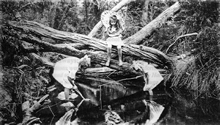
The Sheahan family,
image from a student project
by Kerry Sheahan, 2001.
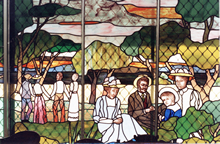
Image of the stain glass window in the Drawing Room of the Rockingham
Museum. This window depicts a family
in a picnic setting in the country.
From student project The Folklore of Rockingham by Marilyn Baker, 1997.
How is the Archive arranged?
Material in the WA Folklore Archive is arranged into the following creators and series. Clicking on the title of each series will take you to the record in the digital archive where you can view the related files and items.
Centre for Australian Studies (WA)
The Centre for Australian Studies was established in 1985 at the WA Institute of Technology, later Curtin University of Technology. Professor Graham Seal set up the WA Folklore Archive through the Centre, with folklore and folklife being key areas of research interest.
The Centre founded the journal Australian Folklore in 1987 and established Black Swan Press in 1992 to publish research in folklore and related fields. While the Centre for Australian Studies no longer exists as a centre, its research areas continue to operate across other research units within the Faculty of Humanities, Folklore teaching and research, for example, is now conducted through the Australia Folklore Research Unit (AFRU).
Centre for Australian Studies Folklore Materials, 1982-2008
This series comprises pre-publication reports, books, conference proceedings, correspondence and other materials relating to folklore and folklife collected by researchers in the Centre for Australian Studies.
Collect Yourself questionnaires, 1985-1991
The series comprises self-administered questionnaires completed by students enrolled in Professor Graham Seal's Folklore unit as part of the Australian Studies degree offered by the WA Institute of Technology (1985-6) and Curtin University of Technology (1987-2010). These questionnaires were referred to as "Collect Yourself" and explore the students' own folklore beliefs and experiences as preparation for their information gathering of folklore in the field.
The students vary in age from late teens to 50+ years and come from a range of ethnic backgrounds. The genres of folklore collected in these surveys include general customs and beliefs, childlore, adultlore, jokes, songs, biographical narrative, children's rhymes, slang, riddles, reprographics, poetry, omens, luck, stories, remedies, games, recipes, dances, foodways, medicine, divinations and drinking customs.
Folklore fieldwork projects, 1985-2001
This series comprises approximately 170 fieldwork projects undertaken by students completing units in folklore at the West Australian Institute of Technology (1985-6) and Curtin University of Technology (1987-2010). As well as written reports, many projects include some or all of the following: interviews/oral histories; photographs; completed questionnaires; and material objects. The subject areas covered by the fieldwork projects include: Perth urban legends, graffiti, folklore of pregnancy and childbirth, brothel-lore, folklore of isolated communities, weddings, cemetery lore, droving traditions, kitchen traditions, drinking games, folk medicine, religious lore, folklore of place, superstitions, dancing and migrants.
Foothills Connection Community Heritage Project
The Foothills Connection Community Heritage Project was a joint initiative of the Shire of Kalamunda, the Centre for Australian Studies at Curtin University of Technology and the J S Battye Library of West Australian History. The aim of the project was to promote community identity in the Foothills region of Kalamunda Shire, including High Wycombe, Maida Vale, Forrestfield and Wattle Grove.
Volunteers from the Foothills region were trained by specialists from the Battye Library to record oral history interviews in the community. The Centre for Australian Studies provided expertise in collecting and collating local folklore.
Folklore materials collected by the Project include oral history interviews, photographs, poetry and music. Folklore materials from the Foothills Connection Community Heritage Project have been deposited in the Battye Library of West Australian History, the Kalamunda Public Library Local History Collection and the Western Australian Folklore Archive.
Interviews conducted for the Foothills Connection Project, 1987-1990
This series comprises synopses, transcripts and audio recordings of approximately 75 oral history interviews conducted by residents in the Foothills region of the Shire of Kalamunda. Themes covered in the interviews include childhood, transportation, marriage, farming, schooling, migration, family life, home remedies, the Depression years, religion, local associations, gardening, poetry, racism, social life, community work, recreation, superstitions, ghost stories and medicine.
Photographs collected for the Foothills Connection Project
This series comprises photographs relating to the oral history interviews conducted by residents in the Foothills region. As well as images of the interviewees, there are historical photographs of the Foothills area and residents provided by participants.
Kel Watkins
Kel Watkins is a comedian and yarnspinner. Born in Mukinbudin in the Wheatbelt, Kel has been collecting folktales and other lore since the 1970s and 1980s. Kel's collected materials have been used in some of his performances and published in book and audio format. Based in Perth, Kel's comedy and yarnspinning has taken him around the world to many audiences and venues including Australia, the United States, Canada, Scotland, Germany, Holland, France, Spain and Singapore.
Live performances by Kel Watkins
This series comprises sound recordings of Kel Watkins performing at various venues between 1980 and 1986. The performances feature tall stories, stories from personal experience, bush ballads, and tales from the 1950s. Recording from the the Toodyay and Perth Festivals in Western Australian, as well as other venues within Australia and the United States are included.
Radio interviews and recordings of Kel Watkins
This series consists of radio interviews with Kel Watkins in Western Australia, South Australia and various locations in the United States. A number of these recordings involve the telling of ballads and bush stories.
This series comprises published works and videos on string figures. The publications include String around the world by Kel Watkins and Mike & Michelle Jackson. Video recordings include demonstrations on the art of string figures by Kel Watkins.
Publishing and unpublished works on folklore and storytelling
This series consists of published and unpublished works collected or written by Kel Watkins. Some of this material was used by Kel in his performances of bush ballads and yarns.
Western Australian Folklife Project
The WA Folklife project was initiated in 2004 as a partnership between the National Library of Australia, the Australian Folklore Network and the Australian Folklore Research Unit at Curtin University.
Western Australian Folklife Project reports and research
This series comprises copies of the research output and reports of the WA Folklife Project. Rob and Olya Willis carried out the fieldwork, recording and documenting the memories of Western Australian interviewees. These materials are deposited with the National Library of Australia and the WA Folklore Archive. Interviews have been conducted each year since 2004, with the exception of 2008, when no fieldwork took place. Reports, interviews on CD and images document the work undertaken for this project.
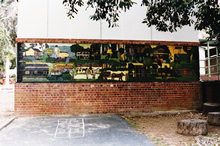
Mural on old schoolroom at the
Glen
Forrest Primary School
completed by students for the 1991 Centenary.
Image from student project
Glen Forrest: Proud to belong
by Margaret Fowler, 1996.
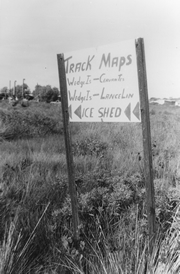
Image from student project
The Folklore of Wedge Island
by Christine Eyres, 1998.
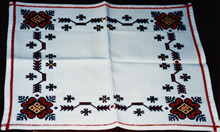
Example of Ukrainian craft work, from student project Ukrainian Folklore in Australia by Bernice Cameron, 1991.
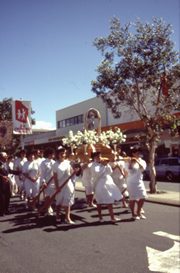
Parade during the Fremantle
Fishing Fleet Festival, from student
project by Lyn Le Provost, 1989.
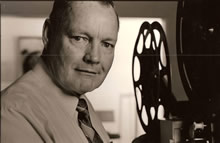
Basil Archer, ca 1988, a participant
in the Foothills Connection
Community Heritage Project.
CUL00088/1/2.
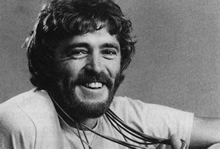
Kel Watkins, comedian and yarnspinner.
Image from String games by
Kel Watkins and Mike & Michelle Jackson, Hodja Educational Resources, 1986.
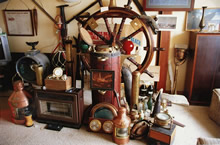
Image of the personal collection of
Mick Stubbs, participant in the
WA Folklife Oral History Project, 2006. CUL00079/2/8.
Support and Cooperation
The WA Folklore Archive and Curtin University acknowledge the support of the following individuals and organisations who contributed to the development of the content of the Archive and/or the creation of the digital archive and accompanying website:
- Professor Graham Seal
- Kel Watkins
- WAIT and Curtin folklore students
- Rob and Olya Willis
- Community members whose oral history interviews, photographs and other materials form a vital part of the collection
- The Myer Foundation
- National Library of Australia
- Kalamunda Shire Council
- State Library of WA
- Australian Folk Trust
- Australian War Memorial
- ABC Radio
- Vietnam Veterans' Association of Australia (WA)
- Curtin's Faculty of Humanities
 |
||||||||